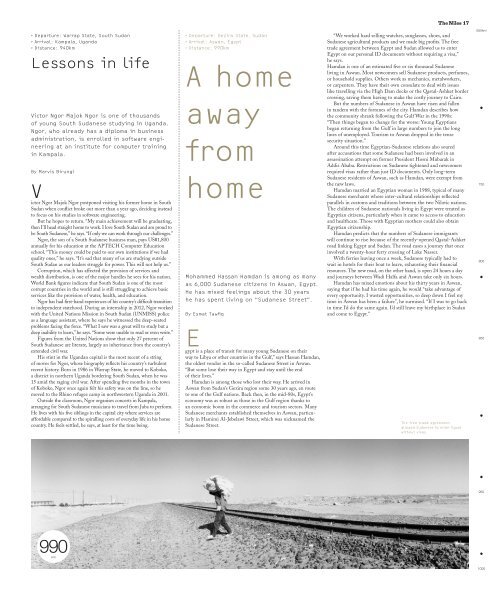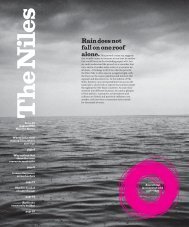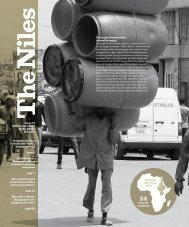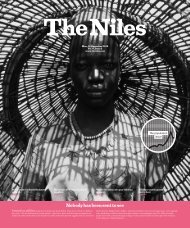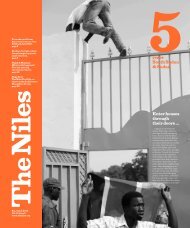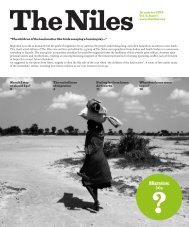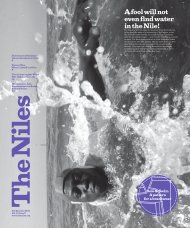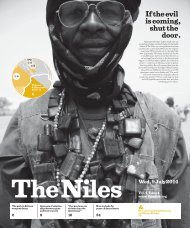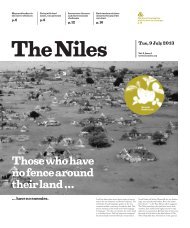Experience is a solid walking stick...
I don’t know where to start. I wish I had taken my wife. Who am I without my school certificates? These three remarks by refugees, scribbled into notebooks by The Niles correspondents, support the Sudanese proverb that ‘experience is a solid walking stick’. War, hunger and poverty have repeatedly forced both Sudanese and South Sudanese to flee their homes. Right now more than 4.5 million people are on the road in the two countries, like these passengers on a bus from Khartoum to Shendi. The fifth edition of The Niles documents their journeys, following their routes to neighbouring villages, fast-expanding cities or the other side of the globe, revealing diverse experiences with a recurring theme: When you leave home, the familiar is lost but the essential remains.
I don’t know where to start. I wish I had taken my wife. Who am I without my school certificates? These three remarks by refugees, scribbled into notebooks by The Niles correspondents, support the Sudanese proverb that ‘experience is a solid walking stick’. War, hunger and poverty have repeatedly forced both Sudanese and South Sudanese to flee their homes. Right now more than 4.5 million people are on the road in the two countries, like these passengers on a bus from Khartoum to Shendi. The fifth edition of The Niles documents their journeys, following their routes to neighbouring villages, fast-expanding cities or the other side of the globe, revealing diverse experiences with a recurring theme: When you leave home, the familiar is lost but the essential remains.
You also want an ePaper? Increase the reach of your titles
YUMPU automatically turns print PDFs into web optimized ePapers that Google loves.
The Niles 17<br />
> Departure: Warrap State, South Sudan<br />
> Arrival: Kampala, Uganda<br />
> D<strong>is</strong>tance: 940km<br />
Lessons in life<br />
Victor Ngor Majok Ngor <strong>is</strong> one of thousands<br />
of young South Sudanese studying in Uganda.<br />
Ngor, who already has a diploma in business<br />
admin<strong>is</strong>tration, <strong>is</strong> enrolled in software engineering<br />
at an institute for computer training<br />
in Kampala.<br />
By Marv<strong>is</strong> Birungi<br />
Victor Ngor Majok Ngor postponed v<strong>is</strong>iting h<strong>is</strong> former home in South<br />
Sudan when conflict broke out more than a year ago, deciding instead<br />
to focus on h<strong>is</strong> studies in software engineering.<br />
But he hopes to return. “My main achievement will be graduating,<br />
then I’ll head straight home to work. I love South Sudan and am proud to<br />
be South Sudanese,” he says. “If only we can work through our challenges.”<br />
Ngor, the son of a South Sudanese business man, pays US$1,800<br />
annually for h<strong>is</strong> education at the APTECH Computer Education<br />
school. “Th<strong>is</strong> money could be paid to our own institutions if we had<br />
quality ones,” he says. “It’s sad that many of us are studying outside<br />
South Sudan as our leaders struggle for power. Th<strong>is</strong> will not help us.”<br />
Corruption, which has affected the prov<strong>is</strong>ion of services and<br />
wealth d<strong>is</strong>tribution, <strong>is</strong> one of the major hurdles he sees for h<strong>is</strong> nation.<br />
World Bank figures indicate that South Sudan <strong>is</strong> one of the most<br />
corrupt countries in the world and <strong>is</strong> still struggling to achieve basic<br />
services like the prov<strong>is</strong>ion of water, health, and education.<br />
Ngor has had first-hand experiences of h<strong>is</strong> country’s difficult transition<br />
to independent statehood. During an internship in 2012, Ngor worked<br />
with the United Nations M<strong>is</strong>sion in South Sudan (UNMISS) police<br />
as a language ass<strong>is</strong>tant, where he says he witnessed the deep-seated<br />
problems facing the force. “What I saw was a great will to study but a<br />
deep inability to learn,” he says. “Some were unable to read or even write.”<br />
Figures from the United Nations show that only 27 percent of<br />
South Sudanese are literate, largely an inheritance from the country’s<br />
extended civil war.<br />
H<strong>is</strong> stint in the Ugandan capital <strong>is</strong> the most recent of a string<br />
of moves for Ngor, whose biography reflects h<strong>is</strong> country’s turbulent<br />
recent h<strong>is</strong>tory. Born in 1986 in Warrap State, he moved to Koboko,<br />
a d<strong>is</strong>trict in northern Uganda bordering South Sudan, when he was<br />
15 amid the raging civil war. After spending five months in the town<br />
of Koboko, Ngor once again felt h<strong>is</strong> safety was on the line, so he<br />
moved to the Rhino refugee camp in northwestern Uganda in 2001.<br />
Outside the classroom, Ngor organ<strong>is</strong>es concerts in Kampala,<br />
arranging for South Sudanese musicians to travel from Juba to perform.<br />
He lives with h<strong>is</strong> five siblings in the capital city where services are<br />
affordable compared to the spiralling costs of everyday life in h<strong>is</strong> home<br />
country. He feels settled, he says, at least for the time being.<br />
> Departure: Gezira State, Sudan<br />
> Arrival: Aswan, Egypt<br />
> D<strong>is</strong>tance: 990km<br />
A home<br />
away<br />
from<br />
home<br />
Mohammed Hassan Hamdan <strong>is</strong> among as many<br />
as 6,000 Sudanese citizens in Aswan, Egypt.<br />
He has mixed feelings about the 30 years<br />
he has spent living on “Sudanese Street”.<br />
By Esmat Tawfiq<br />
Egypt <strong>is</strong> a place of transit for many young Sudanese on their<br />
way to Libya or other countries in the Gulf,” says Hassan Hamdan,<br />
the oldest vendor in the so-called Sudanese Street in Aswan.<br />
“But some lose their way in Egypt and stay until the end<br />
of their lives.”<br />
Hamdan <strong>is</strong> among those who lost their way. He arrived in<br />
Aswan from Sudan’s Gezira region some 30 years ago, en route<br />
to one of the Gulf nations. Back then, in the mid-80s, Egypt’s<br />
economy was as robust as those in the Gulf region thanks to<br />
an economic boom in the commerce and tour<strong>is</strong>m sectors. Many<br />
Sudanese merchants establ<strong>is</strong>hed themselves in Aswan, particularly<br />
in Hamimi Al-Jebelawi Street, which was nicknamed the<br />
Sudanese Street.<br />
“We worked hard selling watches, sunglasses, shoes, and<br />
Sudanese agricultural products and we made big profits. The free<br />
trade agreement between Egypt and Sudan allowed us to enter<br />
Egypt on our personal ID documents without requiring a v<strong>is</strong>a,”<br />
he says.<br />
Hamdan <strong>is</strong> one of an estimated five or six thousand Sudanese<br />
living in Aswan. Most newcomers sell Sudanese products, perfumes,<br />
or household supplies. Others work as mechanics, metalworkers,<br />
or carpenters. They have their own consulate to deal with <strong>is</strong>sues<br />
like travelling via the High Dam docks or the Qastal-Ashket border<br />
crossing, saving them having to make the costly journey to Cairo.<br />
But the numbers of Sudanese in Aswan have r<strong>is</strong>en and fallen<br />
in tandem with the fortunes of the city. Hamdan describes how<br />
the community shrank following the Gulf War in the 1990s:<br />
“Then things began to change for the worse: Young Egyptians<br />
began returning from the Gulf in large numbers to join the long<br />
lines of unemployed. Tour<strong>is</strong>m to Aswan dropped in the tense<br />
security situation.”<br />
Around th<strong>is</strong> time Egyptian-Sudanese relations also soured<br />
after accusations that some Sudanese had been involved in an<br />
assassination attempt on former President Hosni Mubarak in<br />
Add<strong>is</strong> Ababa. Restrictions on Sudanese tightened and newcomers<br />
required v<strong>is</strong>as rather than just ID documents. Only long-term<br />
Sudanese residents of Aswan, such as Hamdan, were exempt from<br />
the new laws.<br />
Hamdan married an Egyptian woman in 1988, typical of many<br />
Sudanese merchants whose inter-cultural relationships reflected<br />
parallels in customs and traditions between the two Nilotic nations.<br />
The children of Sudanese nationals living in Egypt were treated as<br />
Egyptian citizens, particularly when it came to access to education<br />
and healthcare. Those with Egyptian mothers could also obtain<br />
Egyptian citizenship.<br />
Hamdan predicts that the numbers of Sudanese immigrants<br />
will continue to r<strong>is</strong>e because of the recently-opened Qastal-Ashket<br />
road linking Egypt and Sudan. The road eases a journey that once<br />
involved a twenty-hour ferry crossing of Lake Nasser.<br />
With ferries leaving once a week, Sudanese typically had to<br />
wait in hotels for their boat to leave, exhausting their financial<br />
resources. The new road, on the other hand, <strong>is</strong> open 24 hours a day<br />
and journeys between Wadi Halfa and Aswan take only six hours.<br />
Hamdan has mixed emotions about h<strong>is</strong> thirty years in Aswan,<br />
saying that if he had h<strong>is</strong> time again, he would “take advantage of<br />
every opportunity. I wasted opportunities, so deep down I feel my<br />
time in Aswan has been a failure”, he surm<strong>is</strong>ed. “If I was to go back<br />
in time I’d do the same again. I’d still leave my birthplace in Sudan<br />
and come to Egypt.”<br />
The free trade agreement<br />
allowed Sudanese to enter Egypt<br />
without v<strong>is</strong>as.<br />
650km<br />
750<br />
800<br />
850<br />
950<br />
990<br />
km<br />
1000<br />
theniles_enar_20150327.indd 17<br />
2015/3/31 1:50 PM


